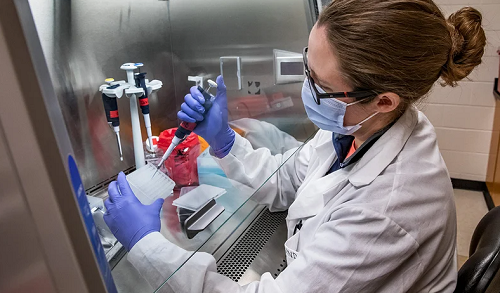
August 19, 2021 – The SARS-CoV-2 virus will continue to evolve, potentially creating an increased risk of infection in both vaccinated and unvaccinated individuals, said Manoj Gandhi, senior medical director for Genetic Testing Solutions, Thermo Fisher Scientific. Because of this, “surveillance testing is critical as we learn to live with this virus,” he said.
As reported earlier this week in the Dail-eNews, Thermo Fisher Scientific (Waltham, MA) announced that the U.S. Food and Drug Administration (FDA) granted emergency use authorization (EUA) for the TaqPath COVID-19 Fast PCR Combo Kit 2.0 and the TaqPath COVID-19 RNase P Combo Kit 2.0, both highly accurate assays designed with increased target redundancy to compensate for current mutations and emerging SARS-CoV-2 variants.
Dr. Gandhi responded to several questions JHC sent to him regarding the importance of surveillance testing.
JHC: Why will variant surveillance be critical in the coming weeks and months (and even years)?
Dr. Gandhi: At the onset of the pandemic, it was important that we had diagnostic tests that were able to detect infection in patients and guide management and the Emergency Use Authorizations (EUA) greatly helped with this. As the pandemic has progressed, the virus has also evolved and the current circulating strains have acquired different biological properties as compared to the original strain, such as increased transmissibility, ability to cause severe disease or evade vaccines. Such strains have been referred to as Variants of Concern (VOC).
In the coming months and the next few years, in addition to the diagnostic tests that are able to “detect” the circulating strains, surveillance testing to “differentiate” the strains is going to be critical. Detection basically indicates that either or any of the circulation strains are present; on the other hand, differentiation s able to specifically identify which particular strain it involved. Similarly, it is important to understand the difference between “infection” and “disease”. While vaccines do not necessarily prevent infection; they prevent against disease and hospitalization. It is more important to perform variant surveillance, especially those that are capable of causing disease in the vaccinated; because if this were to occur, the current vaccines would need to be modified to counter these breakthrough variants.
JHC: How could the mutations affect our day-to-day lives?
Dr. Gandhi: Variants of Concern (VOC) have a ripple effect that not only directly impacts patients but also can become a public health issue. First off, it can lead to hospitalizations and severe disease and in case of outbreaks can lead to stress of health systems to manage influx of COVID-related cases as well as indirectly impacting non-COVID illnesses. It also leads to public health countermeasures to be implemented such as social distancing, mask mandates or even lockdowns. This could mean remote learning for students, remote working, travel restrictions, limitations around indoor and outdoor congregations such as dining and social gathering, testing requirements to demonstrate infection status among others. In addition, there are downstream economic implications, such as loss of jobs, businesses and the economy as a whole. Last but not the least, the social and behavioral impact that results in the population mindset of constantly being in a pandemic state.
JHC: Are doctors/scientists hopeful that we’ll be able to get ahead of variations with advancements and research?
Dr. Gandhi: Yes. There are ways to get ahead of these variations. We have to come to the realization that SARS-CoV-2 will continue to mutate and evolve, will become endemic and seasonality will eventually emerge similar to the seasonal flu. If things are predictable, it becomes easier to prepare and stay ahead of the variants. The most effective way to get ahead of these variants is by vaccination. The current mRNA vaccine technology is one such example of scientific advancement and research that has helped accelerate vaccine development.
Not only does such technologies allow development of vaccines, they also allow for the vaccines to be modified quickly in case new variants were to emerge that can evade vaccines. Another important yet underappreciated way to get ahead of the variants is effective surveillance. Some of the newer approaches to surveillance testing using targeted mutation panels for known variants complemented by sequencing approaches for new variants can help scale up surveillance testing globally and get ahead of the variants before they become a public health crisis.
